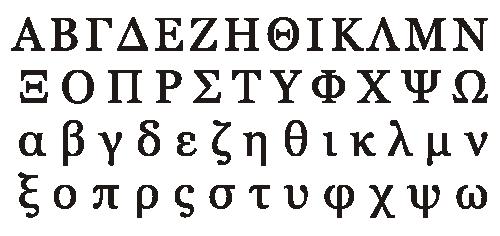CHIOS
Language

Language
Popular destinations GREECE
| Aegina | Alonissos | Andros |
| Chios | Corfu | Crete |
| Hydra | Kalymnos | Karpathos |
| Kefalonia | Kos | Lefkas |
| Lesbos | Mykonos | Naxos |
| Paros | Patmos | Peloponnese |
| Poros | Rhodes | Samos |
| Santorini | Skiathos | Skopelos |
| Spetses | Thasos | Zakynthos |
Language
 Greek AlphabethPhoto: M. Adiputra CC 3.0 Unported no changes made
Greek AlphabethPhoto: M. Adiputra CC 3.0 Unported no changes made
Modern Greek or New Greek belongs to the Indo-European language family and is one of the oldest languages still alive. Although it belongs to the same language family, Greek hardly resembles any other Indo-European language. This is because Greek has been able to develop in relative isolation from foreign influences.
In ancient times, various Greek dialects were used alongside each other, but the Attic of the city of Athens was understood throughout Greece. From the fourth century B.C., Attic received competition from Koinè Greek, a type of generally civilised Greek that was used from Macedonia to the Near East. From that time onwards, Attic was used in education and it was the official government and church language in the Byzantine Empire and in the Church. The common man spoke a kind of folk language descended from Koinè Greek. In the Middle Ages, all kinds of other peoples settled in Greece and the spoken language changed drastically while the written language remained the same, so that the two languages grew further and further apart.
After the War of Liberation in the early 19th century, the government tried to introduce a new language, Katharevousa or "purified language". The government and schools did use this language but the people continued to use Dimotiki, the spoken language of the Greek people. The intention was that Dimotiki would disappear, but that turned out to be more difficult than expected and therefore it failed. From 1920 Dimotiki was allowed to be used in schools and in 1974 Katharevousa disappeared from those same schools.
The Greek alphabet consists of 24 letters that at first sight look complicated, but on closer inspection are simpler than the Dutch alphabet. The rules of pronunciation are regular// and therefore easier to understand. In Greek, it is important to use the correct stress. A word with the stress on the first syllable can have a totally different meaning from the same word but with the stress on the third syllable, for example.
The alphabets of all major European languages are more or less based on the ancient Greek alphabet. Our Roman alphabet is sometimes called the western form of the Greek alphabet.
Some words and expressions:
- One – éna
- Two – dhio
- Three – tría
- Ten – dhéka
- Hunderd – ekató
- Monday- símera
- Wednesday – tetárti
- Sunday – kiriakí
- How much does it cost? – póso káni?
- Please – parakaló
- Bread – psomi
- Eggs – avga
- Meat – kreas
- Salt – alat
- Beer – bira
- Water – nero
Sources
Wikipedia
CIA - World Factbook
BBC - Country Profiles
Last updated January 2026Copyright: Team The World of Info